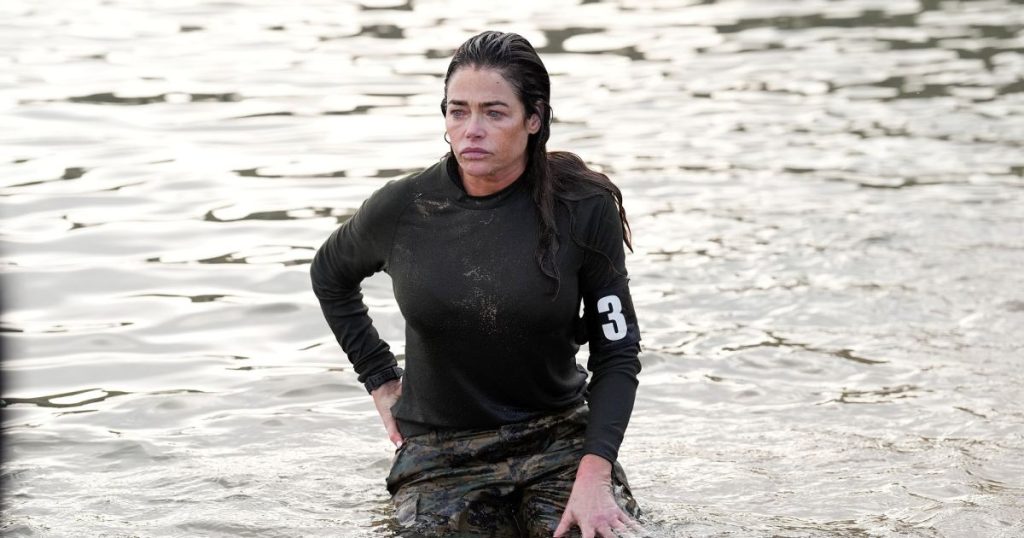Denise Richards’s vulnerability on Special Forces: World’s Toughest Test season 3 provided a poignant glimpse into the motivations behind celebrity participation in such challenging endeavors. The show’s premise, as explained by Directing Staff instructor Billy Bingham, centers on providing a platform for individuals seeking to regain direction, confront their limitations, and reconnect with a sense of grounded reality. The grueling tasks and demanding environment serve as a crucible for self-discovery, pushing participants to their physical and emotional limits. Richards’s experience, particularly her reaction to the first task – a high-stakes jump from a boat to a helicopter – highlighted this core principle. Her inability to complete the task stemmed from a deep-seated fear response, a vulnerability she courageously acknowledged in her subsequent conversation with the staff.
Richards’s candid revelation of past trauma, a harrowing experience of sexual assault at the age of 15, illuminated the profound personal reasons driving her participation in the show. The incident, which she had only previously shared with her husband, left her with a paralyzing fear response in stressful situations. Her desire to overcome this fear, not only for herself but also as a model of strength for her three daughters, underscored the transformative potential of the Special Forces experience. Richards’s willingness to confront her past trauma on such a public platform spoke to the show’s unique capacity to create an environment conducive to vulnerability and personal growth. This environment, fostered by sleep deprivation, hunger, and the overall demanding nature of the program, allows participants to shed their carefully constructed public personas and confront their inner demons.
The "mirror room," a pivotal component of the Special Forces experience, plays a crucial role in facilitating these breakthroughs. The combination of physical and mental exhaustion, coupled with the intimidating atmosphere of the mirror room, creates a space where participants are more likely to open up and share their innermost struggles. Bingham emphasized the unpredictable nature of these revelations, noting that the instructors themselves are often surprised by the stories that emerge. This element of surprise underscores the authenticity of the participants’ emotional responses, highlighting the raw and unscripted nature of the show. Richards’s experience exemplifies the cathartic power of the mirror room; after sharing her trauma, she experienced a noticeable shift in demeanor, shedding a burden that had weighed her down for years.
The Directing Staff’s approach to interacting with the participants is another significant element contributing to the show’s impact. Their poker-faced demeanor, maintained even in the face of deeply personal and often heart-wrenching revelations, provides a sense of stability and neutrality. This allows the participants to express themselves freely without fear of judgment. While acknowledging the emotional toll that these interactions can take on the instructors, Bingham emphasized the importance of maintaining professional composure to create a safe space for vulnerability. Richards’s story, and the staff’s response to it, highlighted this delicate balance between empathy and professional detachment.
The instructors’ blind approach to the show, meaning they don’t know the participants’ identities until filming begins, further reinforces the authentic and unscripted nature of the Special Forces experience. This element of surprise ensures that the instructors interact with the participants based on their present behavior and struggles, rather than on preconceived notions or public personas. Bingham admitted to recognizing only Denise Richards among the season 3 cast, underscoring the level of anonymity afforded to most participants. This approach eliminates any potential bias and allows for genuine interactions and assessments.
The culmination of these factors – the physically and mentally challenging environment, the vulnerability-inducing "mirror room," the instructors’ neutral yet supportive stance, and their initial unfamiliarity with the participants – creates a unique space for personal transformation. Denise Richards’s journey on Special Forces exemplifies this transformative potential. Her courageous decision to share her past trauma and her subsequent experience of catharsis served as a powerful testament to the show’s ability to facilitate profound personal growth. Her story resonated deeply with viewers, highlighting the universality of human struggles and the power of vulnerability in overcoming adversity. The show’s success lies in its ability to create an environment where such authentic moments of human connection can unfold, offering both participants and viewers a unique opportunity for reflection and growth. The inclusion of the National Sexual Assault Hotline number at the end of the article further underscores the show’s commitment to addressing sensitive issues and providing support to those who may be struggling with similar experiences.

